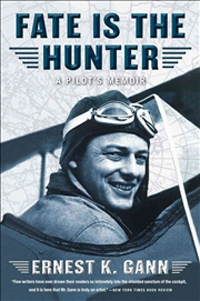Fate is the Hunter: A Pilot’s Memoir

There are books through life that require – demand! – more than one reading. Some to make such mandate on me include:
- Saint Exupery’s meaningful The Little Prince
- Hugo’s historic Les Miserables
- Galsworthy’s delightful The Forsyte Saga and
- Steinbeck’s superb The Grapes of Wrath, among others.
Another, Fate Is the Hunter, I consider a modern classic. I first read it 53 or 54 years ago hot off the press, and have recently reread it for I think the third time. As a sign of its acceptance and, especially, Gann’s undoubted literary ability, the book is still in print and readily available.
Although a book that may initially appear better suited to the male of the species, there is no reason for the woman reader to overlook it; despite its evident overtones of adventure, it is far from a gung-ho tale of male exploits. It tells of men facing all that fate could throw at them in the developmental days of civil aviation and in military air transport during WW2, but written in a style and in a language that make for easy reading. 
The book begins with a quote, ancient Oriental wisdom:
“I’ll tell you how to escape death.
“…there is a raven in the eastern sea called Yitai (“dull-head”). This dull-head cannot fly very high and seems very stupid. It hops only a short distance and nestles close with others of its kind. In going forward, it dare not lead, and in going back, it dare not lag behind. At the time of feeding, it takes what is left over by the other birds. Therefore, the ranks of this bird are never depleted and nobody can do them any harm.”
“A tree with a straight trunk is the first to be chopped down. A well with sweet water is the first to be drawn dry.”
Taikung Jen, in a conversation with Confucius
That piece of philosophy is the preface to the book but certainly not the way of the author. In the main, Gann is the straight trunk, the sweet water. Time and again he manages to avoid the axe, the draining bucket, due to his training, his knowledge, his understanding … and fate.
Overflying impenetrable South American jungle in a twin-engine aircraft with one engine failing – realising this only because he happens to look out a window at the very moment its oil bubbles out of it – and knowing the other engine may suffer the same fate, he is able to take steps that save the day and allow a safe landing.
On take-off from New York’s’ La Guardia airport in a heavily laden four-engine transport, he is barely airborne before engines begin to misfire and lose power under load. With only one engine able to provide full power and with his hands somewhat full, he prevents the aircraft plunging into the river or into a levee bank adjacent to the airport. With the barest amount of power available, and skilled handling, he manages to waft his plane up over the levee to land safely, only to arouse the ire of airport authorities for making an illegal landing!
The reader’s heart ascends to the mouth on many an occasion when reading Fate but Gann’s writing style is straightforward, describing everything factually and – belying how he must have felt at the time! – in a calm, eminently readable manner. That he managed to survive is obvious but it’s the manner of survival that is the essence of the work.
I am an engineer and understand the technicalities about which he writes but this book is much more than that. To quote a lady friend (non-pilot and not in the least adventurous), it amazes her that what effectively reads as an adventure novel (albeit relating to actual events from the writer’s life), so eloquently told and with such good humour, is able to sustain her interest.
As is the case with other books by Gann – novels including The High and the Mighty, Twilight for the Gods, novelised history, Masada, and factual accounts, Song of the Sirens – its readability and entertainment level are both five star.









 Proudly Australian owned and operated
Proudly Australian owned and operated